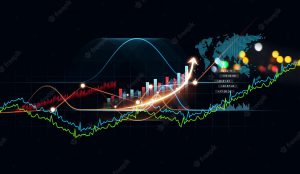Precious Metals
What is an ETF? A beginner’s guide to exchange-traded funds
Understanding ETFs: A Comprehensive Guide Exchange-traded funds (ETFs) are becoming increasingly popular among investors for their versatility and ease…

Understanding ETFs: A Comprehensive Guide
Exchange-traded funds (ETFs) are becoming increasingly popular among investors for their versatility and ease of use. They offer a simple way to gain exposure to a wide range of assets, including stocks, bonds, commodities, and currencies. In this article, we will provide a comprehensive guide to understanding ETFs and how they can be used to build a diversified investment portfolio.
What are ETFs?
An ETF is a type of investment fund that is traded on stock exchanges, just like stocks. They are made up of a basket of assets, such as stocks or bonds, which are chosen to track a specific market index or sector. For example, an ETF that tracks the S&P 500 index will hold shares in the 500 largest companies listed on the New York Stock Exchange. ETFs offer investors the ability to gain exposure to a broad range of assets with a single investment, rather than having to purchase each asset individually.
How do ETFs work?
ETFs are created and managed by fund managers, who select the assets that make up the fund. They are then sold to investors in the form of shares, which can be bought and sold on stock exchanges throughout the day. The price of an ETF is determined by the value of the assets it holds, and it will fluctuate in line with the performance of those assets.
Benefits of ETFs
There are several benefits to investing in ETFs, including:
- Diversification: By investing in a basket of assets, ETFs provide investors with diversification, which can help to reduce risk.
- Low costs: ETFs typically have lower costs than actively managed funds, as they are not required to pay for research or fund management.
- Liquidity: ETFs are traded on stock exchanges, which means they can be bought and sold throughout the day. This makes them a liquid investment, which can be useful for investors who need to access their funds quickly.
- Tax efficiency: ETFs are more tax efficient than other types of investment funds, as they do not require the fund manager to sell assets in order to raise cash.
Risks of ETFs
As with any investment, there are also risks associated with ETFs. These include:
- Market risk: The value of an ETF will fluctuate in line with the performance of the assets it holds. This means that if the market falls, the value of the ETF will also fall.
- Interest rate risk: ETFs that hold bonds are exposed to interest rate risk, which means that if interest rates rise, the value of the bonds will fall.
- Credit risk: ETFs that hold bonds are exposed to credit risk, which means that if the issuer of a bond defaults, the value of the bond will fall.
- ETFs tracking a specific sector or market may be more volatile and subject to greater fluctuations than an ETF that tracks a broader market index
How to Invest in ETFs
There are several ways to invest in ETFs, including:
- Buying shares on a stock exchange: ETFs can be bought and sold on stock exchanges throughout the day, just like stocks.
- Using a brokerage account: Many online brokerages offer the ability to buy and sell ETFs, and some also offer commission-free trading.
- Using a robo-advisor: Some robo-advisors offer ETF portfolios as a way to invest in a diversified range of assets.
Conclusion
ETFs can be a valuable addition to any investment portfolio, offering diversification, low costs, flexibility, and tax efficiency. However, it’s important to keep in mind the risks and considerations associated with ETFs, and to do your own research before making any investment decisions. As you can see in the above diagram, ETFs offer many benefits such as diversification, low costs, flexibility and tax efficiency, but also have some risks such as market risk, liquidity risk, and tracking error. It’s important to do your own research and consider these factors when making investment decisions.
Other Articles of Interest

What is an ETF? A beginner’s guide to exchange-traded funds
Read More

Economic Inequality in the United States: A Comprehensive Overview
Read More

Maximize Your Returns: The Ultimate Guide to Asset Allocation in Investment Management
Read More

Mortgage Rate Trends: Experts Predict the Future
Read More

Tactical Investor Portfolio – Open Positions
Read More

Nasdaq monthly chart? What is it saying
Read More

What is the Velocity of Money
Read More

Geopolitical news: The Energy Crises
Read More

The next Bull Market
Read More

Silver to Gold Ratio
Read More

Interesting Geopolitical Events
Read More

Market Rally: Will the Market Rally This Summer
Read More

The stock market is stuck in a trading zone
Read More

Stock Market Trading range: what’s next?
Read More

History of financial markets: The Masses are Doomed
Read More

Covid Resistance
Read More

Does Technical Analysis work?
Read More

Good Stocks: Value Stocks Usually Fall under this category
Read More

Negative Retained Earnings on the rise in the technology sector
Read More

Market Volatility: To Dance or Not to?
Read More
The post What is an ETF? A beginner’s guide to exchange-traded funds appeared first on Tactical Investor.

Canadian Silver Co. Will See Big Changes in 2024
Source: Michael Ballanger 12/22/2023
Michael Ballanger of GGM Advisory Inc. takes a look at the current state of the market and shares on stock…
EGR options out Urban Berry project in Quebec to Harvest Gold – Richard Mills
2023.12.23
EGR Exploration Ltd. (TSXV: EGR) has moved from owner to shareholder at its Urban Berry project in Quebec, this week announcing it is optioning…
Crypto, Crude, & Crap Stocks Rally As Yield Curve Steepens, Rate-Cut Hopes Soar
Crypto, Crude, & Crap Stocks Rally As Yield Curve Steepens, Rate-Cut Hopes Soar
A weird week of macro data – strong jobless claims but…







